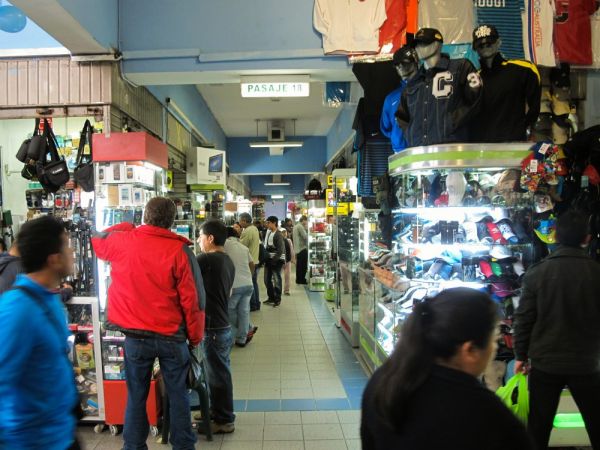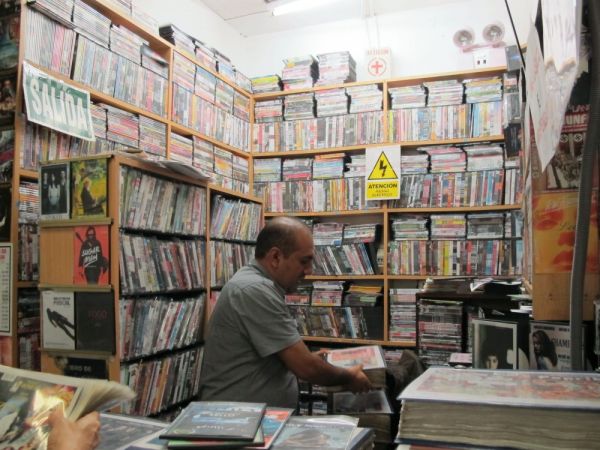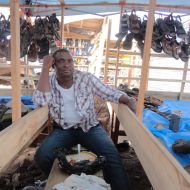Tucked Away in an Illegal Mall, a Trove of Obscure DVDs Attracts Famous Filmmakers

The entrance to Pasaje 18.
It’s a Saturday afternoon, and hundreds of Limeños are out shopping at the Polvos Azules shopping center, peering into small stands, hunting for deals on knockoff Ralph Lauren shirts, contraband Reeboks and bootleg copies of Man of Steel and World War Z.
Polvos Azules, ironically referred to as the city’s “official informal market,” is a place I’ve written about before. But look beyond the market’s polished surface, and one sees that Polvos is more than just the sum of its parts. In fact, a particular section of the shopping center has gained an international following for its vast collection of independent and art films, which has turned it into a sort of impromptu film school.
Pasaje 18 (Spanish for Hallway 18) houses half a dozen stands that specialize in classic movies and hard-to-find films. One of these stands is Mondo Trasho, crammed to the rafters with DVDs. It’s but one of the shops that have made Pasaje 18 famous among film buffs across Peru and beyond. The store was named after the 1969 John Waters comedy – which involves drag queens, the Mother Mary and foot amputations — and holds virtually any obscure movie you could think of. Milton, Mondo Trasho’s owner, sits on a wooden bench in the middle of his store. Short and slightly hunched over, he describes himself as a film connoisseur and latches on excitedly to anyone willing to chat about movies for a while.
Milton sees his store as a cultural repository, where Lima residents can find movies that aren’t normally accessible to them. Asking him if he has a movie in stock is like playing Stump the Film Buff. Need an obscure Japanese kung-fu flick from the 1970s? The original 1982 theatrical cut of Blade Runner? Every film ever made by Alejandro Jodorowsky? Milton has them all, and if you want one he doesn’t have – a rare occurrence – he’ll track it down for you.
“Sometimes clients also give me hard to find films, and I give them movies in exchange,” he tells me.

Milton in his shop, surrounded by rare and hard-to-find DVDs.
Like all the shops in Pasaje 18, Mondo Trasho has a faithful clientele, nearly all of whom Milton knows on a first-name basis. Some of his clients even include local actors and film directors. I ask him if any of these directors are ever opposed to him selling pirated copies of their films.
“There’s been several directors, and they’ve all told me, ‘It’s better for you to be spreading it than to have it locked away,’” he says. Some of them have even left autographs behind as tokens of appreciation.
Indeed, Milton speaks candidly about his businesses, and says he doesn’t feel his shop or others like it hurt independent filmmakers. “Since I’ve been here there hasn’t be any client who’s said, ‘This is my movie, I don’t want it here.’” He says many filmmakers are happy to see their movie reach a bigger audience, even if not through legal channels. A local documentary filmmaker, Milton says, even buys pirated copies of his own films from Mondo Trasho so he can give them to his students.
“Even now, during the last film festival, many foreign directors left me their movies to spread,” he tells me, adding that he usually gives them a couple of films in return. “They leave happy.”
Juan Daniel Molero, a young Peruvian filmmaker, tells me that the stands in Pasaje 18 were like film school for him. “A stand in Pasaje 18 had, like, 10 times more films than my college’s film library,” he says. Molero, who’s films have made the rounds at international festivals, says he’s also left copies of his work at shops in Pasaje 18. He tells me his first feature-length film sold around 80 copies there, and later went on to be shown at the Museum of Modern Art in New York.
When foreigners come looking for local films at Pasaje 18, he says, his work gets seen by an audience it might not reach through normal channels. “This is where most of film education comes from,” he says.
A day before I visited Polvos Azules, acclaimed Thai filmmaker Apichatpong Weerasethakul, winner of the prestigious Palme d’Or prize, had paid a visit to Pasaje 18. Weerasethakul, who was in Lima to attend a film festival, told a reporter Polvos Azules reminded him of shopping centers he’d seen in Hong Kong and Thailand, and said he was surprised to find his own films there.
“I think piracy is the path,” he said during an interview with a local newspaper. “While we have many different economies, [piracy] will remain. What we have to do is act naturally, and work with people’s needs.”
Molero agrees. “Today no one yet knows how to distribute films,” he says. “If they pirate your films its because there is something good in them. If you’re not being pirated, that’s when you have to worry.”
Photos by Manuel Vigo









